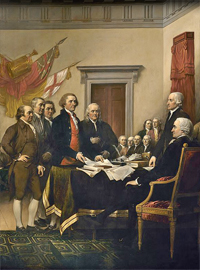| Dodd-Frank, ObamaCare, and the Erosion of the Rule of Law |
 |
|
By Timothy H. Lee
Thursday, July 11 2013 |
This article was originally published by Forbes on June 10, 2013. “…He has erected a Multitude of new Offices, and sent hither Swarms of Officers to harass our People, and eat out their Substance…” – The Declaration of Independence Since our inception, we’ve aspired to remain a nation of laws, not of men. For that to be true, however, our laws must be of sufficient clarity that we can understand them and guide our conduct accordingly. Otherwise, the rule of law dissipates, and the tyranny of bureaucrats expands. On March 23, 2010, for example, President Obama signed into law the Patient Protection and Affordable Care Act, commonly known as “ObamaCare.” That 2,700 page monstrosity also generated between 20,000 and 30,000 additional pages of regulations, depending on how one counts them, and that regulatory labyrinth continues to grow. Just four months later, on July 21, 2010, Obama signed another monstrosity into law: the Dodd-Frank financial reform bill, an 850-page bill that has generated over 2,000 pages of interpretive regulations so far and could require “as many as 398 new regulations,” according to the Competitive Enterprise Institute. “Worse,” according to The Economist magazine, “every other page demands that regulators fill in further detail. Some of these clarifications are hundreds of pages long.” More recently, the U.S. Senate passed a 1,200-page immigration reform bill last month without sufficient time to even read it. As the number of these mega-bills are debated and passed without being read, let alone understood either by lawmakers or the people they represent, We the People may fairly ask: Why? Why must any law exceed a thousand pages? Why can’t our elected officials speak and write in more straightforward language, declaring clear principles and drawing clear lines of demarcation understandable to reasonably intelligent citizens? By way of comparison, the U.S. Constitution, our founding document that has endured over 200 years and created the most prosperous society in human history, was printed on just six pages – four pages of base text, one being the letter of transmittal and a final page containing the Bill of Rights. With a little help from their civics teachers, American schoolchildren read it in middle school. If a law is too large to even be read, it is presumably too large to be understood, much less effectively and justly applied. Mega-bills become laden with contradictory directives, foggy standards, and small implanted codices ripe for abuse by politically driven, overzealous regulators and prosecutors. In such a byzantine maze of laws and regulations, what assurances do ordinary Americans have that they are not, in some way and to some degree, constant lawbreakers in the eyes of a vast and growing government? When the Supreme Court heard arguments last year on the constitutionality of ObamaCare in a case brought by the governors of several states, the Justices faced precisely that question – how can they deal with such a large, unwieldy piece of legislation? When one lawyer suggested the Justices read the law in its entirety, Justice Breyer asked incredulously, “So what do you propose that we do other than spend a year reading all this?” Justice Scalia responded similarly by asking, “What happened to the Eighth Amendment?” If the nation’s Supreme Court, on which nine of the nation’s most able lawyers serve, openly mocks the idea that it can read and comprehend such a massive and complex law in its entirety, what does that suggest about the state of our government and the rule of law? When lawyers and judges cannot fully understand the provisions of these thousand-page bills, much less the tenfold pages of regulations they generate, how can ordinary people know our duties and abide by them? An age-old principle in the rule of law is that ignorance of the law is no excuse for breaking it. But when it comes to these mega-bills, we are all necessarily ignorant of the law because they are too large and complex for any individual to grasp. We are legally compelled to know the unknowable. As citizens subject to these mega-bills, we become no longer ruled by laws evenly and equally applied, but rather by the arbitrary will of politically driven bureaucrats. In turn, the legal and political Brahmin class becomes empowered to use these laws and regulations as weapons against an ignorant public and an overwhelmed system of courts. Eventually, as these mega-bills and their encroachments into the free economy take effect, Americans gradually become resigned to them and to the increasingly authoritarian form of government they usher in. Even our friends on the Left who support the passage of these measures should ask themselves whether this is the form of government they truly want. Even if one stipulates that these measures are well-intentioned, what but lawlessness and bureaucratic suffocation can this onslaught of mega-bills have on the bedrock principle of a free society – the rule of law? As we recently celebrated our independence, we would be wise to heed Thomas Jefferson’s words more faithfully. |
Related Articles : |
























